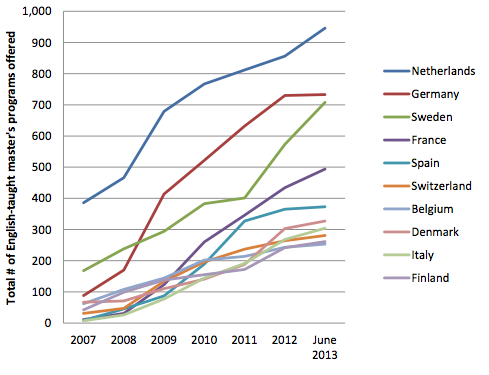The number of fully English-taught Masters in Europe has increased by 42% since 2011 – growing at a faster rate than the number of overall Master’s programs in Europe – due to increasing demand for an English medium higher education, according to a new briefing paper from the Institute of International Education (IIE).
News and business analysis for Professionals in International Education
Have some pie!
Europe: Boom in English-taught Masters
 Increase in English-taught master’s programs in top host countries from 2007 to 2013
Increase in English-taught master’s programs in top host countries from 2007 to 2013 The development of these programmes gives new access to destinations previously inaccessible to international students
The growth in competitive Masters programmes that are attractive to both European and international audiences could have a significant impact on mobility flow in and outside of Europe the report claims.
Based on data collected through MastersPortal.eu– a search engine providing information on around 90% of Europe’s English- taught Masters programmes- the brief shows the Netherlands and Germany had the largest offering of English-taught Masters programs from December 2011 to June 2013, while Denmark and Sweden added the most number of courses each growing by 74% and 73% in the same period.
“Europe still has a lot of potential in growing the amount and level of the international students they attract in their programmes,” said Edwin van Rest, the report’s co-author and CEO of StudyPortals, MastersPortal.eu’s parent company. “Many European countries offer unique quality-for-money.”
The number of Masters programmes taught entirely in English rose from 3,701 at the end of 2011 to 5,258 in June 2013, while programmes taught partially in English only grew from 963 to 1,149 over the same period, accounting for a 19% increase in total.
Denmark has the highest number of English-taught programmes per higher education institution (HEI), with an average of 20.4 programs offered per organisation in 2013. France offers the least with an average of 3.6 programmes per HEI.
Business and economics as well as engineering and technology are the most popular subjects studied in English, accounting for half of all the English-taught programmes. Social sciences and natural sciences follow closely, occupying 14% and 9% of the total share of English-taught programmes.
“Very often people call higher education a traditional and slow moving field/industry. However, if you look at changes in fees, impact of technology, and as shown the explosive growth of international offers, the reality shows the opposite,” van Rest explained.
In the Netherlands and Sweden – third and fourth most popular host countries according to page views – demand for two-year degree offerings has overtaken the demand for one-year degree programmes. The same was true for Germany, France, Spain, Italy, Finland, Belgium and Switzerland.
Page views revealed an already tangible shift away from the UK as a study destination
The development of these programmes gives new access to destinations previously inaccessible to international students and “may have a dramatic impact on international student flows both within and outside of Europe” the report argues.
Page views at MastersPortal.eu revealed an already tangible shift away from the UK as a study destination, with the nation’s programmes only receiving 24% of total page views in 2013 compared to the 31% in 2011.
Meanwhile Germany – the second most popular destination after the UK – has increased its share of total page views from 14% to 18%.
This briefing paper was produced through the recently launched IIE Center for Academic Mobility Research which brings together IIE’s in-house research expertise with leading minds from around the world to conduct and disseminate research and policy analysis in the field of international student and faculty mobility.
Still looking? Find by category:


